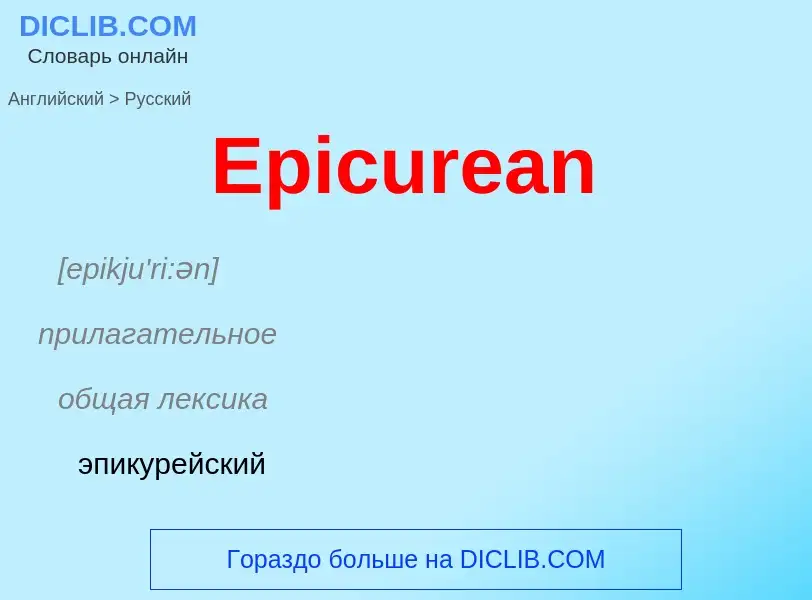Traducción y análisis de palabras por inteligencia artificial ChatGPT
En esta página puede obtener un análisis detallado de una palabra o frase, producido utilizando la mejor tecnología de inteligencia artificial hasta la fecha:
- cómo se usa la palabra
- frecuencia de uso
- se utiliza con más frecuencia en el habla oral o escrita
- opciones de traducción
- ejemplos de uso (varias frases con traducción)
- etimología
Epicurean - traducción al Inglés
[epikju'ri:ən]
прилагательное
общая лексика
эпикурейский
относящийся к Эпикуру и его последователям
(epicurean) эпикурейский
чувственный
существительное
[epikju'ri:ən]
общая лексика
эпикуреец
последователь Эпикура
прилагательное
общая лексика
эпикурейский
существительное
синоним
Definición
Wikipedia

Epicureanism is a system of philosophy founded around 307 BC based upon the teachings of the ancient Greek philosopher Epicurus.
Epicurus was an atomic materialist, following in the steps of Democritus. His materialism led him to a general attack on superstition and divine intervention. Epicureanism was originally a challenge to Platonism. Later its main opponent became Stoicism. Although Epicureanism is a form of hedonism insofar as it declares pleasure to be its sole intrinsic goal, the concept that the absence of pain and fear constitutes the greatest pleasure, and its advocacy of a simple life, make it very different from "hedonism" as colloquially understood. Following the Cyrenaic philosopher Aristippus, Epicurus believed that the greatest good was to seek modest, sustainable pleasure in the form of a state of ataraxia (tranquility and freedom from fear) and aponia (the absence of bodily pain) through knowledge of the workings of the world and limiting desires. Correspondingly, Epicurus and his followers generally withdrew from politics because it could lead to frustrations and ambitions that would conflict with their pursuit of virtue and peace of mind.
Few writings by Epicurus have survived. Diogenes Laërtius preserves three letters written by Epicurus as well as a list of the Principal Doctrines of Epicureanism. However, there are independent attestations of his ideas from his later disciples. The epic poem De rerum natura (Latin for On the Nature of Things) by Lucretius presents the core arguments and theories of Epicureanism in one unified work. Many Epicurean texts have also been found on scrolls unearthed at the Villa of the Papyri in Herculaneum, mostly works written by the Epicurean philosopher Philodemus or his teacher Zeno of Sidon along with fragments of works by Epicurus himself. Diogenes of Oenoanda, a wealthy Epicurean in the 2nd century AD, had a portico wall inscribed with tenets of the philosophy erected in Oenoanda, Lycia (present day Turkey).
Epicureanism flourished in the Late Hellenistic era and during the Roman era, and many Epicurean communities were established in places such as Antioch, Alexandria, Rhodes, and Herculaneum, but by the late 3rd century AD Epicureanism all but died out, being opposed by other philosophies (mainly Neoplatonism) that were then in the ascendant. Interest in Epicureanism was resurrected in the Age of Enlightenment and continues in the modern era.


![''[[De rerum natura]]'' manuscript, copied by an Augustinian friar for Pope [[Sixtus IV]], c. 1483, after the discovery of an early manuscript in 1417 by the humanist and papal secretary [[Poggio Bracciolini]] ''[[De rerum natura]]'' manuscript, copied by an Augustinian friar for Pope [[Sixtus IV]], c. 1483, after the discovery of an early manuscript in 1417 by the humanist and papal secretary [[Poggio Bracciolini]]](https://commons.wikimedia.org/wiki/Special:FilePath/Lucretius, De rerum natura.jpg?width=200)

